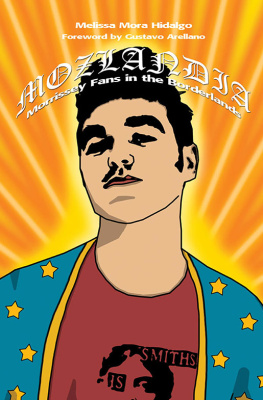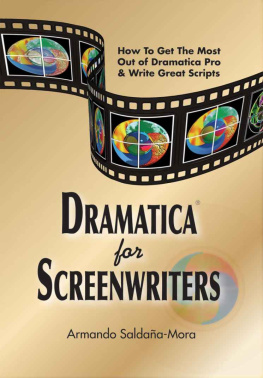Pat Mora - Borders
Here you can read online Pat Mora - Borders full text of the book (entire story) in english for free. Download pdf and epub, get meaning, cover and reviews about this ebook. City: Houston, year: 1986, publisher: Arte Público Press, genre: Romance novel. Description of the work, (preface) as well as reviews are available. Best literature library LitArk.com created for fans of good reading and offers a wide selection of genres:
Romance novel
Science fiction
Adventure
Detective
Science
History
Home and family
Prose
Art
Politics
Computer
Non-fiction
Religion
Business
Children
Humor
Choose a favorite category and find really read worthwhile books. Enjoy immersion in the world of imagination, feel the emotions of the characters or learn something new for yourself, make an fascinating discovery.
- Book:Borders
- Author:
- Publisher:Arte Público Press
- Genre:
- Year:1986
- City:Houston
- Rating:4 / 5
- Favourites:Add to favourites
- Your mark:
- 80
- 1
- 2
- 3
- 4
- 5
Borders: summary, description and annotation
We offer to read an annotation, description, summary or preface (depends on what the author of the book "Borders" wrote himself). If you haven't found the necessary information about the book — write in the comments, we will try to find it.
Borders — read online for free the complete book (whole text) full work
Below is the text of the book, divided by pages. System saving the place of the last page read, allows you to conveniently read the book "Borders" online for free, without having to search again every time where you left off. Put a bookmark, and you can go to the page where you finished reading at any time.
Font size:
Interval:
Bookmark:
 The publication of this volume is made possible through grants from the National Endowment for the Arts, a federal agency, and the Texas Commission for the Arts. The following poems first appeared in the publications here noted: Bilingual Christmas and The Grateful Minority in Contact II; Maestro in Password; Love Like Champagne in The Pawn Review; My Mask in New Worlds Unlimited; Disquise in Snippets; Woman Mysteriously Disappears in Phantasmagoria; Same Song in Puerto del Sol. Recovering the past, creating the future Arte Pblico Press
The publication of this volume is made possible through grants from the National Endowment for the Arts, a federal agency, and the Texas Commission for the Arts. The following poems first appeared in the publications here noted: Bilingual Christmas and The Grateful Minority in Contact II; Maestro in Password; Love Like Champagne in The Pawn Review; My Mask in New Worlds Unlimited; Disquise in Snippets; Woman Mysteriously Disappears in Phantasmagoria; Same Song in Puerto del Sol. Recovering the past, creating the future Arte Pblico PressUniversity of Houston
452 Cullen Performance Hall
Houston, Texas 77204-2004 ISBN 978-0-934770-57-6
LC 85-073352
 The paper used in this publication meets the minimum requirements of the American National Standard for Permanence of Paper for Printed Library Materials, ANSI Z39.48-1984. All rights reserved.
The paper used in this publication meets the minimum requirements of the American National Standard for Permanence of Paper for Printed Library Materials, ANSI Z39.48-1984. All rights reserved.Copyright 1986 by Pat Mora
Printed in the United States of America 9 0 1 2 3 4 5 6 7 8 12 11 10 9 8 7 6 5 4 for Vernwho believes
We knew: similar but different. II And we knew of grown-up talk, how even in our own home like became unlike, how the childs singsong I want, I want burned our mouth when we whispered in the dark. III But us? You and I whove talked for years tossing words back and forth success, happiness back and forth over coffee, over wine at parties, in bed and I was sure you heard, understood, though now I think of it I can remember screaming to be sure. So who can hear the words we speak you and I, like but unlike, and translate us to us side by side?
He searched for stories about his people and finally gave their words sound, wrote the books he didnt have, we didnt have. And he graduated over and over until one day he was Chancellor Rivera, famous Chicano, too needed, his hands too full of us to sit alone and write green stories alive with voices, fiesta of the living, pressing, the present pressing like the hands reaching out to him, and hed hug the small, brown hands, his hands whispering his secret learn, learn his face a wink, teasing out their smiles, a face all could rest in, like the cherries he picked, dark, sweet, round a pit, tooth-breaker for the unwary, the lazy, the cruel. His hands knew about the harvest, tasted the laborers sweat in the sweet cantaloupes he sliced, knew how to use laughter to remove stubborn roots of bitter weeds: prejudice, indifference, the boy from Crystal City, Texas, not a legend to be shelved, but a man whose abrazos still warm us yet say, Now you.
I study hard you say, your smile true, like dawn is, fresh, vulnerable, but my English language scares you, makes your palms sweat when you speak before a class. I say my speeches to my dolls you say. Dolls? The game has changed, girl/child. I hear you once singing to those unblinking eyes lined up on your bed Vbora, vbora de la mar, your words light in your mouth. Now at twenty you stand before those dolls tense, feet together, tongue thick, dry, pushing heavy English words out. In class I hide my hands behind my back.
They shake. My voice too. I know the new rules, girl/child, one by one, vboras Ive lived with all my life, learned to hold firmly behind the head. If I teach you, will your songs evaporate, like dawn?
We do not travel alone. Our people burn deep within us.
Where are your grateful holiday smiles, bilinguals? Ive given you a voice, let you in to hear old friends tell old jokes. Stop flinching. Drink eggnot. Hum along. Not carols we hear, whimpering, children too cold to sing on Christmas eve. Do you see what I see adding a dash of color to conferences and corporate parties one per panel or office slight South-of-the-border seasoning feliz navidad and prspero ao nuevo, right? Relax.
Eat rum balls. Watch the snow. Not twinkling lights we see but search lights seeking illegal aliens outside our thick windows.
Font size:
Interval:
Bookmark:
Similar books «Borders»
Look at similar books to Borders. We have selected literature similar in name and meaning in the hope of providing readers with more options to find new, interesting, not yet read works.
Discussion, reviews of the book Borders and just readers' own opinions. Leave your comments, write what you think about the work, its meaning or the main characters. Specify what exactly you liked and what you didn't like, and why you think so.









